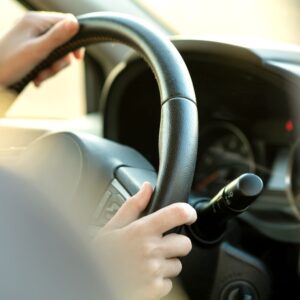A vehicle that suddenly shuts off when you stop isn’t just a nuisance. It’s also a big red flag that you should never ignore. In most cases, it’s a sign that there’s something wrong with your car, so it’s important to figure out what’s causing your engine to turn off or stall before it gets worse.
Why Your Car Shuts Off When Stopped
Here are the possible reasons why your car suddenly turns off when stopped:
Damaged or Dirty Idle Air Control Valve

The idle air control (IAC) valve regulates airflow when the throttle is closed, allowing your engine to idle smoothly. When an IAC valve malfunctions, it can restrict the airflow and cause the engine to turn off when you stop your car. IAC valves can also be electrically faulty or mechanically stuck, depending on the design.
Overheating Engine
An overheating engine can trigger various safety features to prevent further damage to the vehicle. For some vehicles, this can include the engine automatically turning off. Of course, if you have an overheating problem, you’ll have more to worry about than the stalling concern.
PCM Issues
As your vehicle’s main computer, the powertrain control module (PCM) can cause several issues when it malfunctions. The PCM controls fuel delivery and idle speed and can cause stalling if it malfunctions.
Vacuum Leaks
A crack or loose vacuum hose can allow air to enter or escape the engine, interfering with the air-fuel mixture. Take note that this depends on where the vacuum leak is located and how big a leak it is (some vacuum leaks will actually make the engine run faster on a fuel-injected speed density platform). This can significantly affect the engine’s performance, such as a complete shutdown when accelerating, slowing down, or coming to a stop.
Clogged Air Filters
Clogged air filters can cause engine stalling if they’re suddenly saturated with water when driving through a deep puddle or if they get clogged with mud during that maneuver, but they won’t cause the engine to stall at idle.
Why Your Car Randomly Shuts Off When Slowing Down
Diagnosing a car that suddenly shuts off when you slow down can be tricky, especially because the issues mentioned above can also cause it. Here are other possible causes to consider:
Stuck Open EGR Valve? Very rarely
EGR isn’t supposed to flow on a gas burner engine when it’s idling, but usually a stuck open EGR valve won’t cause stalling. It’ll only cause rough idling, low engine vacuum, and an intake plenum that gets very hot very quickly after first starting.
Lockup Torque Converter Issues
When the lockup part of the torque converter fails to disengage when you decelerate, it’s like stopping a manual transmission vehicle without depressing the clutch while the transmission is still in gear. It kills the engine.

Issues with the electronic throttle body components can cause engine stalling. This is one of the more common reasons for engine stalling on newer cars.
Malfunctioning Sensors
Your vehicle relies on several different sensors to ensure the engine and various systems are all functioning properly. If any of these sensors malfunction, then your car can suddenly shut off on its own.
For example, a faulty TP sensor can report the wrong throttle angle and cause the engine to stall.
Electrical Issues
Electrical issues, such as a faulty ignition switch, damaged wirings, and malfunctioning electronic control units (ECUs), can cause your engine to stall, backfire, or perform poorly.
Why Does My New Car Turn Off When I Stop?
Most modern vehicles come with a start-stop system, which temporarily shuts off the engine when you step on the brakes. While the exact technology can differ depending on your vehicle’s year, make, and model, this is how most start-stop systems work:
- After you press the brake pedal and the vehicle comes to a complete stop, the start-stop system turns off the engine while keeping the radio, headlights, and other accessories on.
- After you release the brakes and step on the gas, the engine automatically restarts.
It’s a convenient feature that lessens emissions and fuel consumption.
How To Prevent Your Vehicle From Stalling
With so many possible causes behind a stalling vehicle, repairs can certainly be a headache. Luckily, prevention is quite simple. Here are helpful tips on how to prevent your car from stalling:
- Follow your manufacturer’s maintenance schedule.
- Change your fluids regularly, such as the transmission fluid, power steering fluid, and brake fluid.
- Replace spark plugs and other components when necessary.
- Inspect your vehicle regularly.
A scan tool can also come in handy when spotting any issues early, so consider investing in one of your own.
Any information provided on this Website is for informational purposes only and is not intended to replace consultation with a professional mechanic. The accuracy and timeliness of the information may change from the time of publication.
































